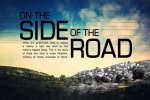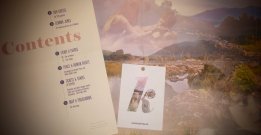F-Rated
Our programme of films featuring the work of female directors has coincided with the development of the F-rating, a new system designed to flag up the significant involvement of women in film, on either side of the camera.
The F-Rating Manifesto
The stories we see on screen influence our lives. We want to hear stories from everyone, not just from one section of society.
We want diversity in filmmaking, both on and off screen.
The F-rating was founded by Holly Tarquini at Bath Film Festival 2014 where we wanted to highlight films which feature prominent women both behind the camera and in front of it.
Every film which ticks yes to the one of the following questions receives the F-rating of approval:
- Does it have a female director?
- Is it written by a woman?
- Is/are there complex female characters on screen who exist in their own right (not simply there to support to the male lead)?
The F stands for feminist.
Feminism is: "The belief that men and women should have equal rights and opportunities." We believe that feminism benefits everyone.
Featuring
Tony Britten (In Love with Alma Cogan) returns to Keswick with his latest film ChickLit.
"Four men, one girl and a mission ..."
Four guys set out to save their local pub by writing a mummy porn novel but someone needs to own up to being the author.
Meet Zoe – an out-of-work actress who takes on the role with gusto leaving our four heroes with the appalling but hilarious prospect of having to churn out erotic novels for the foreseeable future.
A fantastic ensemble cast including Christian McKay, Dakota Blue Richards, Dame Eileen Atkins, Caroline Catz, James Wilby, Niamh Cusack, David Troughton, Miles Jupp, Cathy Tyson, Tom Palmer and of course, Sir John Hurt, ChickLit will raise a smile and a smirk to open KFF 2016.
Winner of the 2014 Cannes Film Festival Grand Prix, The Wonders is a startling second feature from writer-director Alice Rohrwacher. It centers on Gelsomina (Maria Alexandra Lungo) the eldest daughter of a bee-keeping family in rural Tuscany. Her late-in-life exposure to the modern world - in the form of a chintzy reality TV show and its glamorous hostess (Monica Bellucci) – are at odds with her father's proudly traditional way of life. Within its framework this film delivers an intimate response to the age-old conflict between modernity and tradition.
The third documentary by agit-prop duo Mike Bonanno and Andy Bichlbaum, The Yes Men are Revolting sees them take on the issue of climate change and for the first time, reveal something about themselves and their partnership.
Using stunts and faux press conferences to expose the attitudes of big business, the film was crowd-funded with over 2500 people contributing some $146,000.
Val (Regina Casé) is a hard working live-in housekeeper in modern day Sao Paolo and is very used to looking after the everyday needs of her wealthy employers. However, when faced with her estranged daughters sudden appearance, Val is forced to reassess the social boundaries that have kept her set apart from the rest of the household. This is a fast paced and humorous dissection of Brazilian social inequalities that delivers a warm and "deeply moving examination of the essence of family" (USA Today).
A winner at many festivals!
Polisse won the Jury Prize at Cannes and featuring Paris' Child Protection Unit (Polisse is a child's misspelling of police) it portrays some difficult issues and reminds us that abuse is not as far away as we would like to think.
Polisse features multiple story-lines centred on the (often harrowing) experiences of the police men and women in the Unit. Director Maiwenn plays the role of a photographer, assigned to the Unit by the Ministry of Justice and gradually becoming drawn into the lives of those around her.
The potency and fragility of adolescent desire is played out in this striking debut from British novelist Helen Walsh. Based in Birkenhead, Shelly (Lauren McQueen) and Rachael (Brogan Ellis) come from differing backgrounds but both find themselves intertwined with a predatory pawn broker - Mikey (Stephen Lord). Adding to an already intense subject matter, Walsh's use of voyeuristic camera-shots bring the viewer closer to the challenges afflicting these girls.
Helen Walsh will attend the screening and host a Q&A afterwards.
It is easily forgotten that Iceland was something of an economic powerhouse in the last decade. Life in a Fishbowl is the tale of 3 individuals, each with a hidden life, whose stories intertwine in the run-up to the financial crash of 2008.
Eik, a young mother and nursery teacher cannot make ends meet and starts to moonlight; she meets Mori, a poet and novelist and apparent down and out; whose property is coveted by Solvi a banker with eyes towards redevelopment.
A huge hit in its native Iceland 'Fishbowl' is now set to enthral a much wider audience on the Festival circuit.
This Changes Everything is an epic attempt to re-imagine the vast challenge of climate change. Directed by Avi Lewis, and inspired by Naomi Klein's international non-fiction bestseller, the film presents seven powerful portraits of communities on the front lines, from Montana's Powder River Basin to the Alberta Tar Sands, from the coast of South India to Beijing and beyond.
Interwoven with these stories of struggle is Klein's narration, connecting the carbon in the air with the economic system that put it there. Throughout the film, Klein builds to her most controversial and exciting idea: that we can seize the existential crisis of climate change to transform our failed economic system into something radically better.
Unlike many works about the climate crisis, this is not a film that tries to scare the audience into action: it aims to empower. This Changes Everything will leave you refreshed and inspired, reflecting on the ties between us, the kind of lives we really want, and why the climate crisis is at the centre of it all.
This event will be followed by a Q&A with Hazel Graham, Cumbria Action for Sustainability
Thanks to FilmBuff.
Relaxed Dementia Friendly Screening
Thigh-slappin', sarsaparilla-swiggin', sharp-shootin' Calamity Jane is a woman in a man's world, fitting in the only way she can - by being one of them. As driver of the Deadwood stagecoach, she fearlessly fights off countless Indian ambushes to bring the frontier town its provisions.
Back at the bar, she joins the "mangy pack of dirt trashin' beetles" at the Golden Garter theatre for a drink and recounts tall tales of her daily travails. The only man tougher than her in these parts is the charming but notorious Wild Bill Hickok. Her only feminine weakness is her secret love for Lt Gilmartin.
One of Doris Day's most famous performances with a score packed with Oscar-winning songs, this is a film to take you back in time.
This screening is the first in a programme of dementia friendly film screenings in 2016 funded by Film Hub North and Cumbria Community Foundation.
Jennifer Peedom started out to make a documentary about a Sherpa on his 22nd ascent of Everest, again in support of a well-financed foreign climbing team. For such teams, Sherpas are as essential to their success as ropes or oxygen equipment but valued significantly less.
During filming tragedy struck as an ice fall killed 16 Sherpa guides, which brought many years feelings of injustice to a head – the Sherpas went on strike. The focus of Peedom's film changed immediately and the result is compelling.
This is a Charity Performance in aid of Cumbria Flood Relief.
Described by Mark Kermode as "a poignant examination of the bonds of family love", The Closer We Get is a remarkable documentary film from Karen Guthrie.
Kermode continues, "When her mother is debilitated by a stroke, Karen and her siblings rally round, joined by father, Ian, who left them years ago, but who has remained a powerful presence/absence. Unravelling the complex strands of their home life takes Karen from Scotland to Africa, wondering how she managed to go so long without asking 'how exactly did we get here?'".
We hope that Karen Guthrie will be able to attend the screening and talk about this remarkable film.
Described as a slow burning, very Japanese coming of age drama, Still the Water is a lyrical and moving film set on the sub tropical island of Amami where the land and seascapes provide a compelling backdrop to the story.
Kyoko and Kaito are teenagers with complex relationships with their parents – their own developing relationship is brought into focus by the discovery of a tattooed body washed up on the beach.
Ninth-century China: 10 year-old general's daughter Nie Yinniang is abducted by a nun who initiates her into the martial arts, transforming her into an exceptional assassin charged with eliminating cruel and corrupt local governors. One day, having failed in a task, she is sent back by her mistress to the land of her birth, with orders to kill the man to whom she was promised - a cousin who now leads the largest military region in North China.
The tagline for Lapse of Honour, "In M15, it’s the battle of the fittest", sets the tone for a gritty urban drama. Based in Manchester's Moss Side, the film follows Eve's determination to become a grime artist and her partner Tom's (Tom Collins) enthusiasm to study graphic design. However, in order to leave the drug and gang culture of Moss Side behind, they must first battle to overcome their home lives. It is the first feature of Rayna Campbell and is also a must see for fans of the MOBO nominated rapper Lady Leshurr (Eve) who makes a seamless move into film.
Lapse of Honour will be followed by a Q&A with Rayna Campbell.
Described as cool, funny, but with substance, this sounds like the vampire movie for people who would never go to a vampire movie. This film has garnered wins from festivals from Buenos Aires to Dublin.
Iranian/American director Ana Lily Amirpour describes her debut film as an 'Iranian Vampire Spaghetti Western'. Her film wrong-foots the audience deviously with its aura of shivery nocturnal threat, the point being that the central character is the predator, not the prey. Never given a name, and played by Argo actress Sheila Vand, this apparition in a chador, skateboarding along the black-and-white streets of a fictional Iranian backwater called Bad City, turns out to be a vampire. She feeds mainly on those who've earned it.
On the Side of the Road is an Israeli documentary film written and directed by Lia Tarachansky. The film focuses on Israeli collective denial of the events of 1948 that led to the country's independence and the Palestinian Refugee problem. It follows war veterans Tikva Honig-Parnass and Amnon Noiman as they tackle their denial of their actions in the war. The film also tells the story of its director, Tarachansky, who grew up in a settlement in the West Bank but as an adult began to realize the problems of the Israeli Occupation for the Palestinians.
According to the film's director, the mass displacement of Palestinians in 1948 remains a taboo in Israeli society. In an interview with Frank Barat she said, "The strongest element of Israeli DNA is knowing what questions you cannot ask."
The film was shot over the course of five years and premiered at the First International Independent Film Festival in Tel Aviv.
Thanks to Lia Tarachansky.
With a discussion lead by Avi Levi.
Avi Levi is an ex-Israeli peace and environment activist. He completed his master MA in Peace Studies at The University Of Bradford as a Rotary Peace Fellow in 2013. Back in Israel he led a Fair Trade support project with Palestinian farmers. Avi has worked with Eitan Bronshtein, the founder of Zochrot who is one of the main characters in On the Side of the Road as a facilitator of educational workshops to Israeli and Palestinian youth in Wahat Eal Salam - Neve Shalom. Currently lives with his wife and two children in a housing cooperative in Leeds.
Love is real and Jin Mo-young's documentary My Love, Don’t Cross that River proves it. The film captures moments of elderly couple's Jo Byeong-man and Kang Kye-yeol's last moments of their 76 year marriage, filmed over 15 months. And they were just as in love as they must have been in their vivacious youths. Even though their bodies aged the love and playfulness in their eyes and hearts stayed forever young.
Visually beautiful, ScreenSpace described this documentary as "achingly sweet, funny and insightful".
In the mountains of Pakistan, a mother and her ten-year-old daughter flee their home on the eve of the girl's marriage to a tribal leader. A deadly hunt for them begins.
After a rousing reception at Toronto International Film Festival 2014 and in over 20 countries since then, the critically acclaimed Dukhtar comes to Keswick from Pakistan for its release.
Shirley Clark's film captures Ornate Coleman's evolution over three decades. Returning home to Fort Worth, Texas in 1983 as a famed performer and composer, documentary footage, dramatic scenes, and some of the first music video-style segments ever made, chronicle his boyhood in segregated Texas and his subsequent emergence as an American cultural pioneer and world-class icon.
Clarke was a dancer who studied with Martha Graham before she moved out of performing and into the movie world in the late '50s. She became well known in independent film circles in the early '60s for her films "The Connection" and "The Cool World" before directing a 1964 documentary on poet Robert Frost that won an Academy Award.
Clark original project for a movie about jazz explored Ornate Coleman's decision to use his 11-year-old son Denardo as the drummer for his group. The project foundered in 1969 and was resurrected in 1983 for Coleman's first hometown appearance in 25 years. The film captures much of the improvisational flavour and unorthodox structure of Coleman's singular musical style.
"I knew I was connecting to the way he sounded because the first thing I laid down was the sound," Clarke said, "Having laid the spine down, which was his music, I edited to the music. That's where the rhythms and energy came from. The film looks like how Ornette sounds and has the same basic thinking."
Clarke's use of rapid-fire editing, the juxtaposition of images and its non-linear story line gives the film a far more sweeping scope than a standard portrait of an artist.
An over-protective father locks his seven children in their New York apartment in order to prevent them experiencing the dangers of life outside. Film becomes their window on the world and gorging on all-night sessions of VHS, the brothers turned their prison-like conditions into a site of creativity and play.
A chance meeting with a filmmaker on a rare trip outside the apartment led to the making of this extraordinary documentary, re-enacting scenes from their favourite films - homemade costumes and all - and seeing the interaction between the brothers and their strange patriarch.
A print of that black-and-white photograph, one of the most famous in jazz history, had for years hung in the office of Jean Bach's husband, Bob, a television executive. On the stoop or standing in front of it were Count Basie, Lester Young, Gene Krupa, Dizzy Gillespie, Thelonious Monk, Art Blakey, Charles Mingus, Horace Silver, Sonny Rollins, Marian McPartland, Coleman Hawkins, Gerry Mulligan, Mary Lou Williams and 44 other musicians (along with children from the neighbourhood).
The late great bassist, Milt Hinton, who is one of the warmest and most charming people interviewed, was also a fine photographer. His wife captured much of the Great Day with a color 8mm movie camera, and it's a treat to see the ensemble milling about on the street and taking their places for the final picture.
Many of the people in the photo are not and never were household names. But the musicians Jean Bach tracked down to give their reminiscences are quick to give them their due. They recognize their skill and talent and recall the personalities of their lesser-known counterparts; the jazzmen really did warm up to Jean Bach if they didn't already know her, and they ended up talking about everything.
Jean Bach does the seemingly impossible with A Great Day in Harlem. She makes a 40-year-old B&W photograph come alive.
Maya, a choreographer at a Jerusalem dance troupe, is married to Yoav, a senior official at the Ministry of Justice. A pair of career driven parents with two demanding children, each day requires planning and juggling, a great deal of hubbub.
One evening Maya spots a figure from her past and her evident distress reveals that she is hiding something.
"AKA Nadia is a film about choice: the choice of life, even at the price of sacrifice. It's about mothers and daughters, identities and truth and lies" - Tova Ascher
































